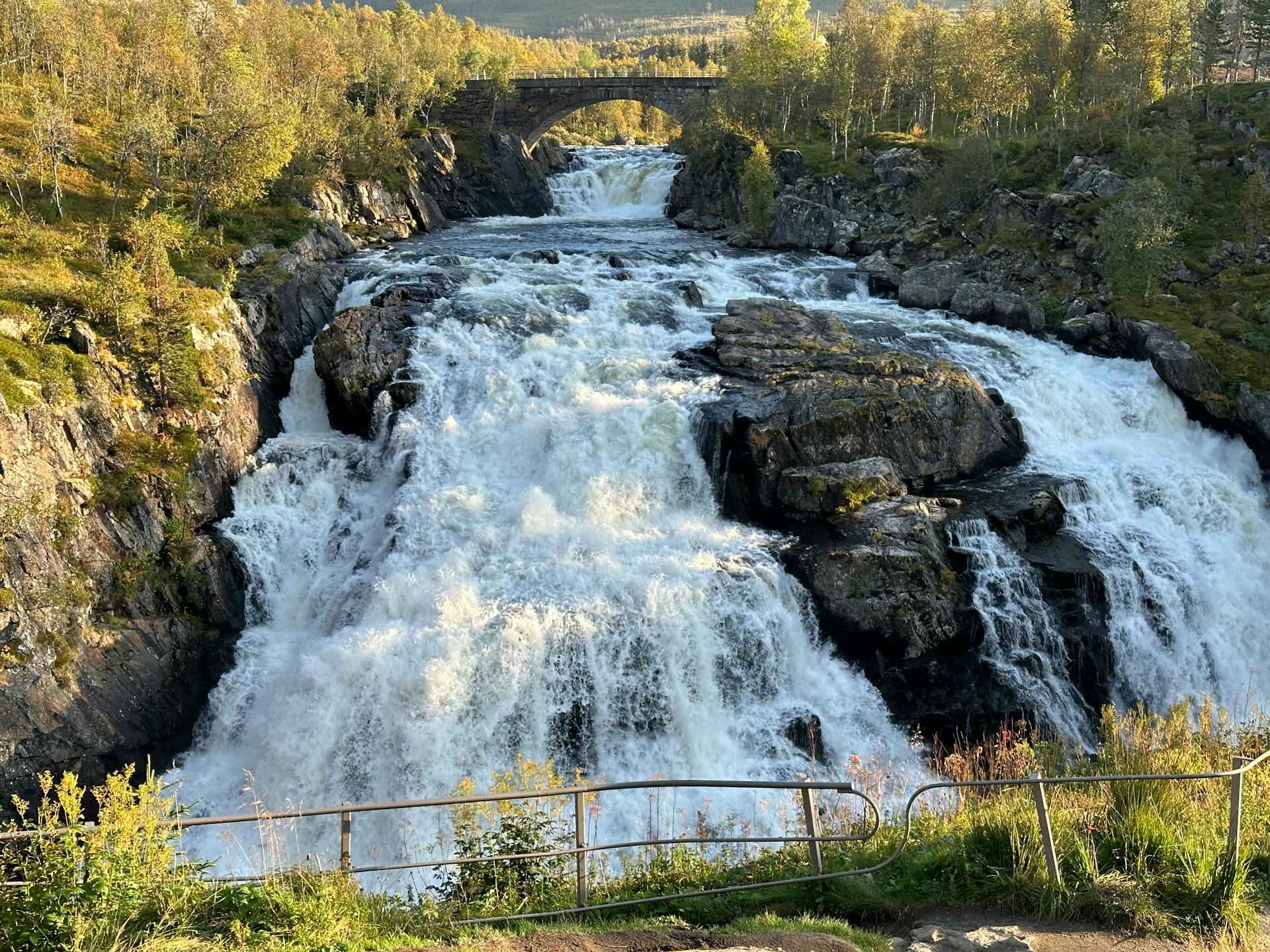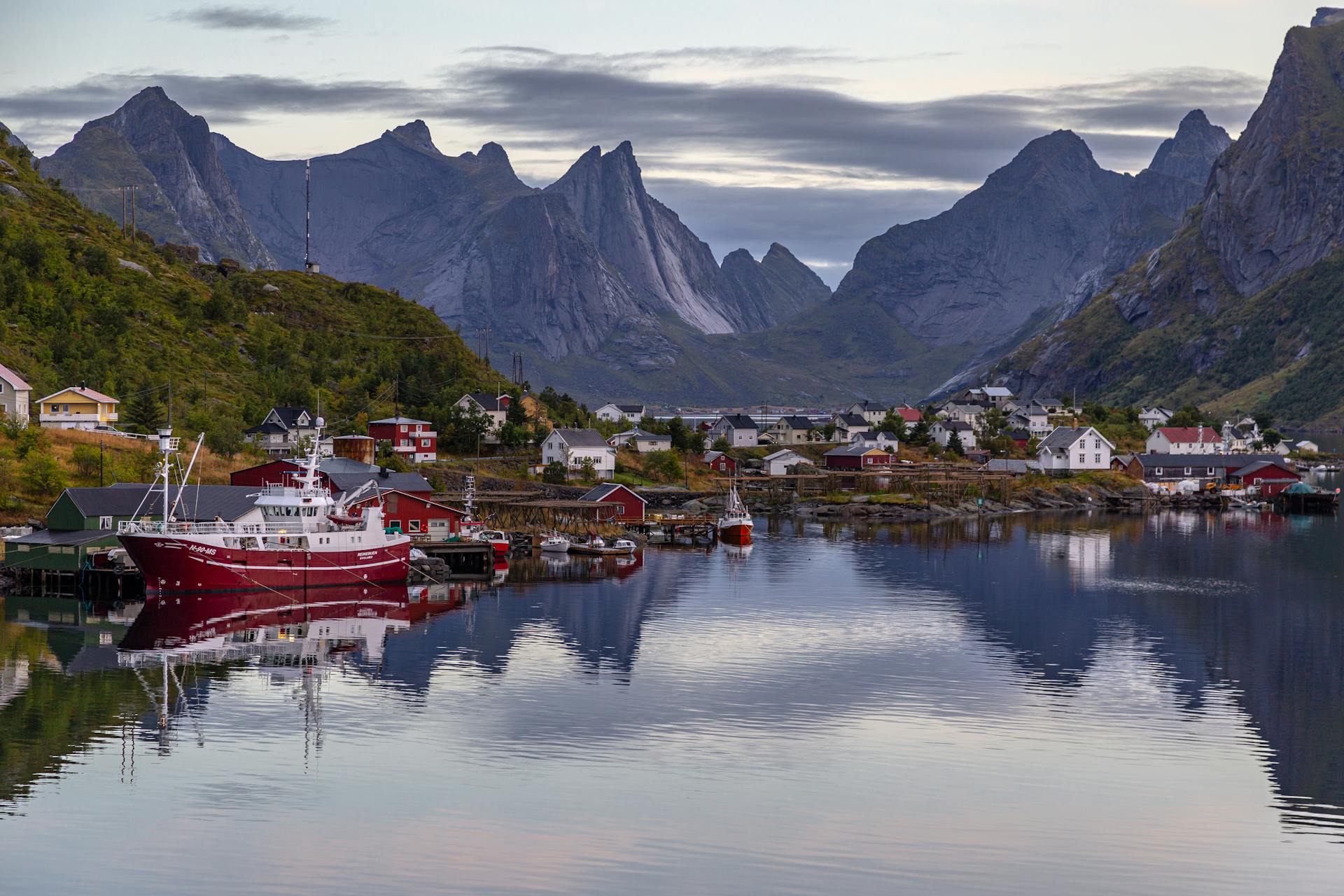
The Norwegian Oil Fund is a unique entity that manages Norway's oil wealth, aiming to balance the country's economic interests with environmental concerns. It's a delicate task, but one that's crucial for Norway's future.
The fund was established in 1990 to manage the country's oil revenues and ensure a stable economy. This was a forward-thinking move, considering the boom-and-bust nature of the oil industry.
Norway's oil fund has grown to become the world's largest sovereign wealth fund, with over $1 trillion in assets. This is a staggering amount that requires careful management to ensure its long-term sustainability.
The fund's investment strategy is guided by a set of ethical guidelines, known as the "Ethical Guidelines for the Norwegian Government Pension Fund Global."
Government Pension Fund
The Government Pension Fund of Norway is a vital part of the country's wealth management, with two separate funds: the Government Pension Fund Global (GPFG) and the Government Pension Fund of Norway (GPFN). The GPFG is the world's largest sovereign wealth fund, established in 1990 to invest surplus revenues from the Norwegian petroleum sector.
If this caught your attention, see: Pension Fund
The GPFG is invested in 8,763 companies in 71 countries, with a value of over 19 trillion Kroner as of November 2024. This fund is not a traditional pension fund, but rather a wealth fund backed by oil profits.
The Government Pension Fund – Norway (SPN) was established in 1967 as a national insurance fund, with a value of NOK 384 billion in autumn 2024. It is required to limit its investments to companies in the Norwegian stock market, predominantly on the Oslo Stock Exchange.
The two funds are managed separately, with the GPFG managed by Norges Bank Investment Management (NBIM) and the SPN managed by Folketrygdfondet. The GPFG has the potential to influence corporate governance in Europe and possibly China, and has started to push for lower executive pay.
In 2016, Norway made its first withdrawal from the fund, with the ability to withdraw up to 3% of the fund's value each year. The fund's value is forecast to reach $1 trillion by the end of 2019, according to the Norwegian Ministry of Finance.
You might like: Stable Value Fund
Background and Debate
Norway has experienced economic surpluses since the development of its hydrocarbon resources in the 70s, leading to the creation of the Government Pension Fund-Global (GPF-G).
The fund was created to mitigate volatility stemming from fluctuating oil prices, which have been a constant concern for oil-dependent countries since the start of the oil boom in the 1970s. The real GDP of oil-exporting states is linked with the price of oil, making it a goal of these exporters to stabilize oil consumption patterns.
International investment has increased at a significantly higher pace than either global GDP or global trade of goods and services, increasing by 175% over a period at which the former two metrics increased by 53% and 93% respectively.
The Oil Fund has become a hot political issue in Norway, dominated by three main issues: the use of petroleum revenues for the state budget, the financial safety of the fund's high exposure to the stock market, and the ethics of the investment policy.
A unique perspective: Isa Investment Funds
Background

Norway has been experiencing economic surpluses since the development of its hydrocarbon resources in the 1970s. This has led to the creation of the Government Pension Fund-Global (GPF-G), also known as the Oil Fund.
The instability of oil prices has been a concern for oil-dependent countries since the oil boom in the 1970s. The real GDP of oil-exporting states is closely linked with the price of oil.
International investment has been increasing at a significantly higher pace than global GDP or global trade of goods and services. Over a certain period, international investment increased by 175%, while global GDP and global trade of goods and services increased by 53% and 93% respectively.
Additional reading: Types of Private Investment Funds
Debate
The debate surrounding Norway's Oil Fund is a contentious one, with three main issues dominating the discussion.
The first issue is whether the country should use more of the petroleum revenues for the state budget instead of saving the funds for the future. This is a matter of concern for many, as it could lead to increased government spending and potentially higher inflation.
The Oil Fund's exposure to the stock market is around 65 percent, which raises questions about financial safety. Some argue that this high level of exposure is risky, while others claim that the fund's diversification and long-term nature will mitigate this risk.
The investment policy of the Petroleum Fund is also under scrutiny, with some questioning its ethics.
Ethics and Exclusions
The Norwegian Oil Fund has taken a small step in the right direction by voting to include tax ethics in their investments. This is the first time measures have been passed to combat tax havens and financial secrecy.
In May 2016, the Parliament requested that the Oil Fund produce an "expectation document" on tax for companies they invest in. This document should cover aggressive tax planning, the use of tax havens, and financial secrecy.
The wording of the parliamentary resolution is quite vague, which raises concerns that the document might not be produced at all. However, the minority who supported additional measures will be important building blocks for raising the bar in the Oil fund's approach to tax ethics in future.
Here are some of the additional measures that were supported by the minority:
The Oil Fund still has a long way to go before it can be considered an ethical investor, but these small steps are a good start.
Ethical Council
The Norwegian Parliament has taken a step in the right direction by requesting the government to ask Norges Bank to consider developing an expectations document on tax for companies they invest in.
The document is supposed to cover aggressive tax planning, tax havens, and financial secrecy, such as shell companies and trusts. Unfortunately, the wording is very vague, which might lead to the document never being produced.
A small minority in the Parliament supported additional measures that could be building blocks for raising the bar in the Oil fund's approach to tax ethics in the future. These measures include requesting the government to come back to Parliament with an assessment of the Fund's operations in tax havens and how this can be restricted.
The Socialist Left party also proposed measures, including ensuring that NBIM moves its subsidiaries away from secrecy jurisdictions and notifies the relevant tax authorities if unethical tax practices are discovered among companies in the portfolio.
Here are the specific measures proposed by the minority and the Socialist Left party:
- “Parliament requests the Government to come back to Parliament with an assessment of the Fund's operations in tax havens and how this can be restricted.”
- “Parliament requests the government to ensure that unethical tax practices and tax evasion actively followed up in its owner dialogue NBIM.”
- “Parliament requests the Government to ensure that NBIM move its subsidiaries away from secrecy jurisdictions”
- “Parliament requests the Government to ask NBIM notify the relevant tax authorities if NBIM discovers unethical tax practices among companies in the portfolio”
- “Parliament requests the Government to ensure that unethical tax practices and tax evasion are embedded in the exclusion criteria of the ethical guidelines for the Fund. ”
The Oil fund has some investments that are questionable, especially HSBC, UBS, and Credit Suisse, given their offshore histories.
Reinstated Companies
Reinstated companies have a second chance at being part of the fund after making changes to their practices. Several previously excluded companies have been reinstated due to improved behavior.
ST Engineering, a Singapore-based company, was excluded in 2002 for designing and producing land mines and cluster bombs. It was reinstated in 2016 after no longer engaging in these activities.
The reasons for exclusion varied among companies, but some were reinstated due to changes in their business practices. BAE Systems plc, for instance, was excluded in 2005 for producing nuclear missiles, but was reinstated in 2013 after stopping this production.
Companies like DRD Gold Limited and Thales SA were also reinstated after addressing environmental and production-related issues. DRD Gold Limited was excluded in 2007 for serious environmental damage, but was reinstated in 2009 after taking steps to mitigate its impact. Thales SA was excluded in 2005 for producing components for cluster munitions, but was reinstated in 2009 after changing its practices.
A list of reinstated companies and their reasons for exclusion and reinstatement is as follows:
Frequently Asked Questions
How much money is in the Norwegian oil fund?
The Norwegian oil fund has a market value of approximately NOK 15,800 billion. This massive amount is equivalent to over three times Norway's GDP.
What is the average return of the Norway oil fund?
The Norway oil fund has generated an average annual return of 6.30% since 1998. This return outpaces the benchmark index by 0.27 percentage points over the same period.
Why is Norway's sovereign wealth fund so big?
Norway's sovereign wealth fund is the world's largest due to the country's significant oil and gas revenues, which have been invested since the 1990s. This has enabled the fund to grow to over 8,500 global investments across 70 countries.
Why is every Norwegian a millionaire?
Norwegians are not technically millionaires, but the Norwegian Government Pension Fund Global manages a massive wealth fund worth over $1 trillion, which benefits the entire population, making Norway one of the wealthiest countries in the world. This unique system is based on the idea that the country's natural resources belong to everyone.
Who owns Norway's sovereign wealth fund?
The Government Pension Fund of Norway is owned by the government of Norway. It is a sovereign wealth fund collective, meaning it's a shared asset managed by the government.
Sources
- https://www.investopedia.com/terms/g/government-pension-fund-norway.asp
- https://en.wikipedia.org/wiki/Government_Pension_Fund_of_Norway
- https://www.thebanker.com/Can-Norway-s-Oil-Fund-chart-a-course-to-a-greener-future-1586509398
- https://taxjustice.net/2016/06/14/norways-oil-fund-minor-victory-tax-ethics/
- https://www.theguardian.com/business/2019/jun/12/worlds-biggest-sovereign-wealth-fund-to-ditch-fossil-fuels
Featured Images: pexels.com


